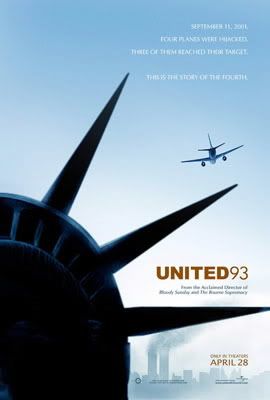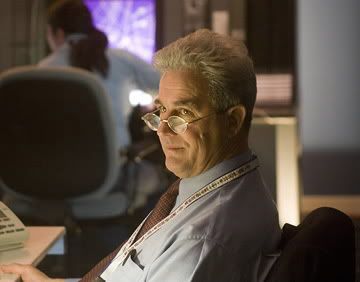
I went to see the new film United 93 today. I encourage everyone to do the same. I found it moving, interesting, inspiring, and respectful. I remember thinking back in 2001 that this story would make a great movie. I'm pleased to see this as the result. It could not have turned out better. It is a grim experience, but also an inspiring and straightforwardly realistic one. United 93 is far surperior to the more voyeristic A&E movie Flight 93. I shudder to think what awaits us in Oliver Stone's film World Trade Center.
To those who worry that it may be too soon, or that they don't know if they can handle it. Don't worry, just go see it. You need to. It is part of our story, and we need to have ways to remember. It would be just as silly to say we should not celebrate Holy Communion anymore or that we can't watch The Passion of the Christ because it is too soon or because we just can't handle it. There are those who were directly affected in New York and Washington who may not see it for that reason. But they do not need to see on film what has already been before their eyes in life.
One special suprise was the marvelous portrayal of Ben Sliney, who was on his first day as the FAA's operations manager. I found out later that he was played by . . . himself (pictured below). Indeed, the director Paul Greengrass used a mixture of actors and real personalities throughout the control room scenes.

Seeing the movie led (appropriately) to my own reflections on the event. I don't think I have ever posted my sermon given on 12 September 2004 at St Alban’s, Arlington, TX. For those interested, it follows below.
Homily for Proper 19
History is replete with turning points. For the Moslem Turks of the Ottoman empire, the most decisive turning point came in 1683. The heretofore conquering Islamic armies of the Sultan were met, held, and thrown back at the gates of Vienna, Austria. The leader Poland’s Christian army, John Sobieki, sent a letter of victory to Pope Innocent XI in which he wrote, similar to Julius Ceasar, "I came, I saw, God conquered." Historians would note that the Ottoman empire never recovered from that defeat. From then on, the world stage was set. It was nearly assured that Western Christian powers would dominate the world stage forever undermining Moslem domination through Europe. For Eastern historians, and especially more enthusiastic religious devotees, the moment was remembered as a humiliation for Islam, and a prelude to more humiliations later on. The date was September 11, 1683.
If anyone had doubts about the Battle of Vienna, those were erased at the Battle of Zenta. The Moslems had made a last ditch effort to destroy Christian civilization in the old Byzantine empire. Fourteen years later to the day, on September 11, 1697, Prince Eugene of Savoy killed 20,000 Turks, seized the Ottoman treasury, and took captive 10 of the Sultan’s wives. By treaty, the Ottomans were forced to cede Croatia, Hungary, Transylvania, and Slavonia to Austria. As you know, it was unrest in this part of the world that later blossomed into "the Great War," or as we now know it, World War I. A number of territories in Europe, Northern Africa, and the Middle East changed hands through the war. And following that conflict, it was on September 11, 1922 the British mandate came into force in Palestine over and against unrelenting opposition from Arabs, who declared it a day of morning. In 1998, the General Assembly of the United Nations declared the 11th of September as an annual International Day of Peace, dedicated "to strengthening the ideals of peace both within and among nations and peoples."
And in 2001, on a cool Tuesday morning, the 11th of September, the United States became part of a conflict she did not begin and, very likely, will not see finished. Those terrorist attacks in New York, Washington, and Pennsylvania have been a little bit more on our mind this time around probably because of the election--people are giving more thought and discussion to the direction of our nation in world affairs, her foreign policy, and matters of security. It just so happened that three years ago I was scheduled to preach on the Sunday following the attacks as a seminarian in Wisconsin. My first thought was overwhelming; what in the world could I say? I was comforted when I looked ahead to the readings for that Sunday, and found one of the images was that of the Good Shepherd.
What biblical image could more vividly relate to homeland security than that of the Good Shepherd, who provides safe pasture for his sheep, keeps watch over his flock, and goes after the one who is lost? John’s gospel tells us that while the enemy has come "to steal, to kill, and to destroy" the flock of God, the mission of Jesus, the Good Shepherd, is just the opposite, "I have come that they might have life, and have it more abundantly" (John 10:10b).
In our Gospel lesson today, we see examples of God’s intense love for us—a love that cannot bear to let a single soul be lost. This is the work of the Good Shepherd, who tends God’s flock, and lays down his own life for the sheep. One of the major themes of Luke’s gospel is the universal call to salvation, that the will of God manifested in Jesus Christ is that God desires all men to be saved.
The Pharisees and scribes asked Jesus why he was dining with these tax collectors and sinners--the dregs of society. Shouldn’t he be concerned with the big picture, not with the little people who will be forgotten? So Jesus tells them a few parables, beginning with a shepherd with 100 sheep. The Good Shepherd cares for each individual—each one is precious. And so Jesus tells us that when one of them is lost, the shepherd leaves the other 99 behind to search for his one lost sheep. When the shepherd finds the little lamb, he doesn’t walk him, but carries him all the way back to the flock. And when the returns, there is great rejoicing.
Jesus adds another parable about a woman who had ten gold coins—her treasure. And when one is lost, she postpones all her work, and does not rest from her search until it is found. And when she finds the coin, she calls her friends over to rejoice with her. That’s what God’s love looks like. And Jesus tells us that likewise there is great rejoicing in heaven, among the angels and saints and all the heavenly host, over each single sinner who repents and is brought back home to God.
I began with a history lesson this morning to show a contrast--between the culture of death and the gospel of life, between history’s concern with armies and battles and turning points, and Jesus’ concern for the individual--especially those who are lost or forgotten about. For those who would seek to terrorize, the individual is not important. They have no reservation about assaulting human dignity, for they do not know the love of God. But for God, the individual is important. God cares about each and every human soul. Each and every human life is precious to him.
Christians have often speculated--"What if?" What if you were the only sinner? What if you were the only one that needed a Savior? Would Jesus still suffer and die on the cross just for you? More than any other, this is the passage that says, "Yes!" For Jesus, it would all still be worth it. He would leave the 99 behind to go after you.
Think of the example of St Paul that we heard earlier. Paul persecuted the Church of God. He made it his mission to root out and destroy the Christian faith, and rid the world of Christians themselves. St Stephen was the first martyr because of St Paul. But God Loved Paul and saved Paul. And the Apostle wrote, "I received mercy for this reason, that in me, as the foremost, Jesus Christ might display his perfect patience for an example to those who were to believe in him for eternal life" (1 Tm 1:16). No one is beyond hope; God never gives up the search. Because God is love, and wills our salvation. For God, each man, woman, and child is like one of the old woman’s coins. Each one is a treasure; and when one is lost, he searches for it and rejoices greatly when it is found.
In the rescue efforts in New York City, I remember seeing on television one fireman whose hands were bloodied from digging through the rubble. And I thought, now there is a model of the love of God, trying desperately to find and save each lost person. For Jesus, each one is a little lamb, each one is a treasure of his heart. And so are you. You are precious to God, and God wills for you to be saved, and to experience the comfort of his life-giving embrace.
How many of us seek to model the love of God in our own lives--the kind of love we read about in the gospel today? There will be endless opportunities. So then, I say seek out the lost, the broken, the forgotten, all those who need the love of God, all those who need to be welcomed inside God’s house to share fellowship with Christ. He has not forgotten those who do not frequent his house. With the Lord’s strength, neither will we.
Let us pray.
O God, whose days are without end, and whose mercies cannot be numbered: Make us, we pray, deeply sensible of the shortness and uncertainty of human life; and let your Holy Spirit lead us in holiness and righteousness all our days; that, when we shall have served you in our generation, we may be gathered unto our fathers, having the testimony of a good conscience; in the communion of the Catholic Church; in the confidence of a certain faith; in the comfort of a reasonable, religious, and holy hope; in favor with you, our God; and in perfect charity with the world. All which we ask through Jesus Christ our Lord. Amen.
May the souls of all the faithful departed, through the mercy of God, rest + in peace. Amen.

No comments:
Post a Comment